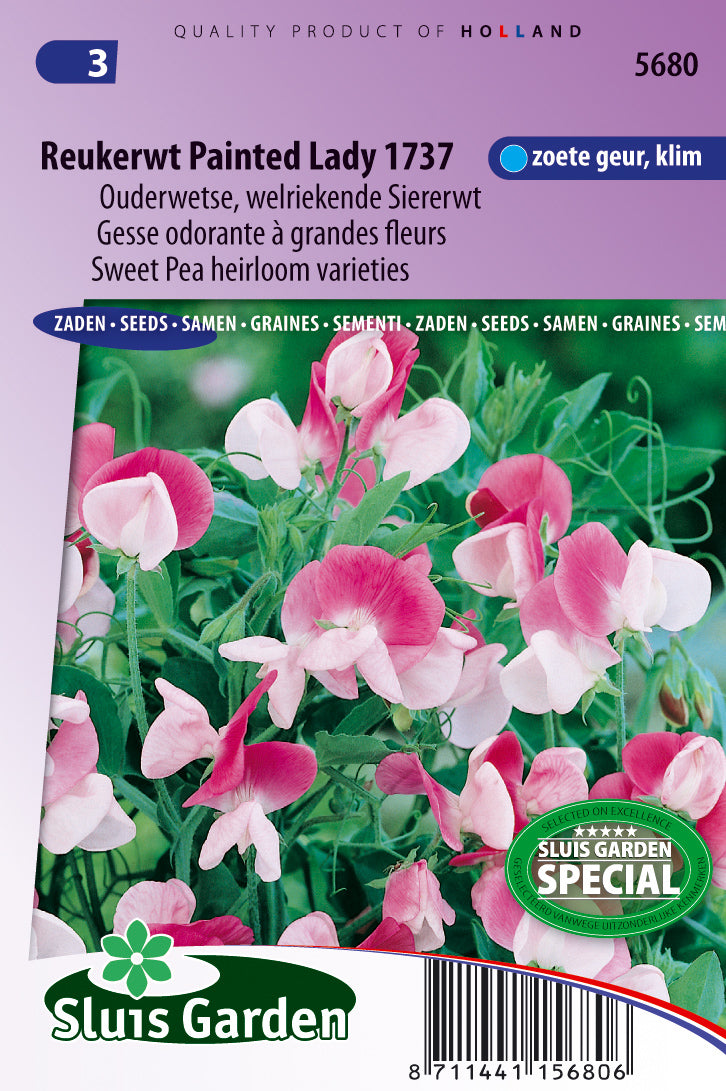1
/
of
1
Lathyrus Grand painted lady 1937
Lathyrus Grand painted lady 1937
Regular price
1.350 KWD
Regular price
Sale price
1.350 KWD
Unit price
/
per
Shipping calculated at checkout.
Couldn't load pickup availability
Lathyrus 'Grandiflorus Painted Lady' is a specific variety of sweet pea known for its beautiful and unique flowers. Here's a guide on how to grow Lathyrus 'Grandiflorus Painted Lady' from 1937:
**1. Planting Time:**
- Plant sweet pea seeds in early spring. You can also start seeds indoors 4-6 weeks before the last expected frost and transplant them outdoors.
**2. Sunlight:**
- Sweet peas prefer full sun, but they can tolerate some shade, especially in hotter climates.
**3. Soil Preparation:**
- Choose well-draining soil with good fertility. Add organic matter like compost to improve soil structure and fertility.
- Aim for a slightly alkaline to neutral soil pH (around 7.0).
**4. Planting:**
- Plant sweet pea seeds about 1 inch deep and 2-3 inches apart. If you're starting indoors, transplant seedlings outdoors once they are sturdy and the danger of frost has passed.
- Provide support such as a trellis or netting for the sweet peas to climb. They are climbing vines and need something to support their growth.
**5. Watering:**
- Keep the soil consistently moist, especially during dry periods. Water at the base of the plants to avoid wetting the foliage, which can lead to diseases.
**6. Fertilizing:**
- Use a balanced, all-purpose fertilizer when planting and apply a blooming fertilizer once the plants start to flower.
**7. Pruning:**
- Pinch off the tips of the plants when they are about 6 inches tall to encourage branching. This results in more flowers.
- Remove spent flowers regularly to promote continuous blooming.
**8. Deadheading:**
- Deadhead spent flowers regularly to encourage continuous blooming and prevent seed formation.
**9. Mulching:**
- Mulching around the base of the plants can help retain soil moisture, suppress weeds, and maintain a cooler root environment.
**10. Pests and Diseases:**
- Keep an eye out for pests like aphids and spider mites. Treat any infestations promptly.
- Ensure good air circulation to prevent fungal diseases.
**11. Winter Care:**
- Sweet peas are typically grown as annuals, but they may self-seed in some areas. Collect seeds if you want to save them for the next year.
**12. Enjoy the Blooms:**
- Once your sweet peas start blooming, enjoy the beautiful and fragrant flowers. They are excellent for cut arrangements, and the more you cut, the more they tend to produce.
Remember to check the specific instructions on the seed packet or plant label for the 'Grandiflorus Painted Lady' variety from 1937, as there may be specific care recommendations for this historical sweet pea variety.
**1. Planting Time:**
- Plant sweet pea seeds in early spring. You can also start seeds indoors 4-6 weeks before the last expected frost and transplant them outdoors.
**2. Sunlight:**
- Sweet peas prefer full sun, but they can tolerate some shade, especially in hotter climates.
**3. Soil Preparation:**
- Choose well-draining soil with good fertility. Add organic matter like compost to improve soil structure and fertility.
- Aim for a slightly alkaline to neutral soil pH (around 7.0).
**4. Planting:**
- Plant sweet pea seeds about 1 inch deep and 2-3 inches apart. If you're starting indoors, transplant seedlings outdoors once they are sturdy and the danger of frost has passed.
- Provide support such as a trellis or netting for the sweet peas to climb. They are climbing vines and need something to support their growth.
**5. Watering:**
- Keep the soil consistently moist, especially during dry periods. Water at the base of the plants to avoid wetting the foliage, which can lead to diseases.
**6. Fertilizing:**
- Use a balanced, all-purpose fertilizer when planting and apply a blooming fertilizer once the plants start to flower.
**7. Pruning:**
- Pinch off the tips of the plants when they are about 6 inches tall to encourage branching. This results in more flowers.
- Remove spent flowers regularly to promote continuous blooming.
**8. Deadheading:**
- Deadhead spent flowers regularly to encourage continuous blooming and prevent seed formation.
**9. Mulching:**
- Mulching around the base of the plants can help retain soil moisture, suppress weeds, and maintain a cooler root environment.
**10. Pests and Diseases:**
- Keep an eye out for pests like aphids and spider mites. Treat any infestations promptly.
- Ensure good air circulation to prevent fungal diseases.
**11. Winter Care:**
- Sweet peas are typically grown as annuals, but they may self-seed in some areas. Collect seeds if you want to save them for the next year.
**12. Enjoy the Blooms:**
- Once your sweet peas start blooming, enjoy the beautiful and fragrant flowers. They are excellent for cut arrangements, and the more you cut, the more they tend to produce.
Remember to check the specific instructions on the seed packet or plant label for the 'Grandiflorus Painted Lady' variety from 1937, as there may be specific care recommendations for this historical sweet pea variety.

